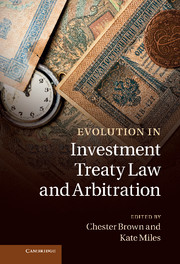Book contents
- Frontmatter
- Contents
- Contributors
- Editors' preface and acknowledgements
- Table of cases
- Table of Treaties
- Part I Introduction
- Part II Shifts in fundamental character
- Part III Actors in international investment law
- Part IV The new significance of procedure
- Part V Engagement with cross-cutting issues
- 21 Protecting intellectual property rights under BITs, FTAs and TRIPS: Conflicting regimes or mutual coherence?
- 22 Stabilisation clauses and sustainable development: Drafting for the future
- 23 A new investment deal in Asia and Africa: Land leases to foreign investors
- 24 Thirst for profit: Water privatisation, investment law and a human right to water
- 25 Economic development at the core of the international investment regime
- 26 Regulatory chill and the threat of arbitration: A view from political science
- Part VI Conclusions
- Index
- References
24 - Thirst for profit: Water privatisation, investment law and a human right to water
from Part V - Engagement with cross-cutting issues
Published online by Cambridge University Press: 05 December 2011
- Frontmatter
- Contents
- Contributors
- Editors' preface and acknowledgements
- Table of cases
- Table of Treaties
- Part I Introduction
- Part II Shifts in fundamental character
- Part III Actors in international investment law
- Part IV The new significance of procedure
- Part V Engagement with cross-cutting issues
- 21 Protecting intellectual property rights under BITs, FTAs and TRIPS: Conflicting regimes or mutual coherence?
- 22 Stabilisation clauses and sustainable development: Drafting for the future
- 23 A new investment deal in Asia and Africa: Land leases to foreign investors
- 24 Thirst for profit: Water privatisation, investment law and a human right to water
- 25 Economic development at the core of the international investment regime
- 26 Regulatory chill and the threat of arbitration: A view from political science
- Part VI Conclusions
- Index
- References
Summary
Introduction
Water is both a valuable commodity and the subject of an emergent human right. These characteristics have proven to be an uncomfortable combination as the scarcity of fresh water has intensified the movement towards a human right to water in parallel to increasing private control over water utilities. At international investment law, contracts for the provision of water utilities continue to be governed by general legal frameworks. In this regard, when a foreign corporation or consortium supplies water to a city or region, that contract operates under the same legal principles that would safeguard any other investment, being those contained within a bilateral investment treaty (BIT) and enforced by international arbitral tribunals. Thus, despite the unique qualities of water, the legal obligations of a host government to protect the foreign investor are not moderated by that government's own responsibility to provide safe water to its citizens.
This chapter examines the interaction between international investment law and issues surrounding the provision of fresh water. In particular, it examines how arbitral tribunals have dealt with the failure of contracts to manage privatised water supplies in developing countries by focusing on three cases of water privatisation: Cochabamba in Bolivia, Buenos Aires in Argentina and Dar es Salaam in Tanzania. Each of these cities privatised their water supplies following World Bank pressure in the late 1990s or early 2000s. City governments undertook a tender process and awarded a contract for water services to a foreign private consortium offering low water prices. Following the takeover, the consortiums found water provision less profitable than their forecasts had predicted. Their subsequent attempts to increase water prices triggered processes which, in each case, led to the city authorities resuming control over water supply and investors taking claims to the International Centre for Settlement of Investment Disputes (ICSID) for breaches of the governing BIT. Despite the similar facts giving rise to these claims, their outcomes were not guided by consistent principles. The case against Bolivia was settled for a nominal sum. Argentina and Tanzania were both found in breach of their obligations under BITs, but only Argentina was required to pay damages.
- Type
- Chapter
- Information
- Evolution in Investment Treaty Law and Arbitration , pp. 570 - 585Publisher: Cambridge University PressPrint publication year: 2011



